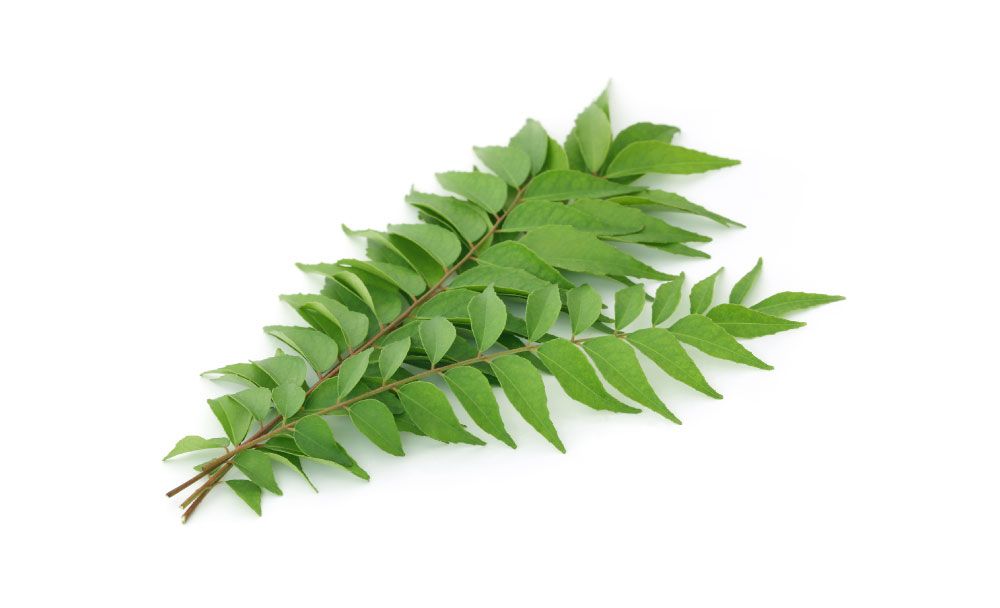
Murraya koenigii (M. koenigii) is usually known as “curry leaves”.[1]
Curry leaves belong to the family Rutaceae and are native to South Asia particularly India, Sri Lanka, and Bangladesh. The use of Murraya koenigii dates back to the 1st and 4th century AD.[2]
Tamil and Kannada literature describes Murraya koenigii as Kari used as a flavoring agent. It is considered one of the important ingredients in South Asian cuisine for its fragrance and aroma. It maintains its flavor and other qualities even after drying, making it to be used as a popular spice and condiment in tropical countries.[2]
Curry leaves also known as kaddi patta contain different essential oils particularly α-pinene (39.93%), sabinene (13.3%), and trans-caryophyllene (9.02%).[2]
However, curry leaves uses extend beyond being just a flavor enhancer. Curry leaves benefits span a huge spectrum of traditional medicinal properties. For centuries, curry leaves medicinal uses have been leveraged in diverse forms and hold a place of pride in Indian Ayurvedic medicine, known as “krishnanimba”.[1]
In this blog, we will explore 10 amazing benefits of curry leaves and how to use them.
Nutritional Value of Curry Leaves
| Nutritional Components | Value Per 100 gms |
| Protein | 6g |
| Fat | 1g |
| Carbohydrate | 18.7g |
| Calcium | 830mg |
| Iron | 0.93mg |
Properties of Curry Leaves:
1. High Fiber
Curry leaves are rich in fiber, which supports digestion and helps regulate bowel movements.
2. Protein Content
Curry leaves are high in protein, which can aid in reducing hair loss and promoting hair growth.
3. Calcium Content
A significant amount of calcium found in curry leaves can help address calcium deficiency and aid in the treatment of osteoporosis.
4. Phosphorus
High levels of phosphorus in curry leaves can assist in cleansing the kidneys and alleviating muscle cramps. Additionally, phosphorus supports overall bone health and energy production.
5. Essential Oils
In traditional medicine, curry leaf oil is utilized to address various ailments such as digestive issues, skin conditions, and hair problems. It is also used as a flavoring agent in cooking, especially in South Indian cuisine.
Curry Leaves Benefits
1. Aids in Digestion
Curry leaves benefits are many. The scented curry leaves are widely used in flavouring curries to promote appetite and digestion.[2] Baked or crisped curry leaves are used to regulate vomiting. Finely ground leaves mixed in butter milk have positive effects on stomach upsets and act as laxatives when taken on an empty stomach.[2]
Curry leaves have a traditional use, either whole or in parts, as an antidiarrheal agent.[1]
2. Promotes Hair Growth

Curry leaves for hair are extremely beneficial. Fresh curry leaves for hair are a popular home remedy used for ages. When boiled with a coconut oil mixture, the curry leaves are reduced to a black residue to produce an excellent hair tonic. This tonic is used for retaining a normal hair tone and improving hair growth.[1] This ensures curry leaves benefits for hair.
3. Antifungal Properties
Ayurveda mentions numerous curry leaves benefits. It is a popular antifungal agent.[1] The essential oil of curry leaves was reported to possess antifungal activity. The antifungal activity of curry leaves is due to the presence of phytochemical constituents of complex molecular structures and diverse action mechanisms, namely, alkaloids, terpenoids, flavonoids, phenolics, tannins, and saponins.[1]
4. Enhances Skin Health

Curry leaves contain antioxidants that help in preventing skin damage caused by free radicals. Its antifungal activity is responsible for the treatment of skin eruptions and infections.[1]
5. Anti-inflammatory properties
Curry leaves can be given as an analgesic, cure for piles, body heat reducer, and thirst quencher, and are also helpful in reducing inflammation and itching. This is attributed to the anti-inflammatory properties of curry leaves.[1]
Certain studies on rats have shown that oral administration of curry leaves extract showed the reduced formation of edema induced by carrageenan, histamine, and serotonin.[1]
6. Regulates Cholesterol
Curry leaves have anti-hyper-cholesterol effects that help in reducing bad cholesterol levels in the body.[2] Another study showed that the oral administration of curry leaves supplements helped reduce the total cholesterol of the body.[1]
7. Neuroprotective activity
Supplementation with curry leaves extracts has been reported in the management of a wide spectrum of neurodegenerative diseases, like AD, PD, and others.[1]
Treatment with curry leaves significantly restored the levels of protective antioxidant enzymes (that is, SOD, CAT, and GSH) and inhibited LPO in the forebrain region.[1]
8. Anti-diabetic properties
Diabetes mellitus, a metabolic disorder, is becoming a serious threat to human health.[1]
Alkaloids present in curry leaves have been explored and reported to have inhibitory effects on the aldose reductase enzyme, glucose utilization, and other enzyme systems for extending anti-diabetic effects.[1]
9. Wound healing
Wound healing is a complex and multifactor process involving numerous biochemical and cellular processes which help in the restoration of functional and anatomical continuity.[1] Curry leaves benefits extend their properties to wound healing through significantly increased wound contraction and speed up the wound healing process.[1] [2]
10. Anti-cancer Activities
Curry leaves possess potential secondary metabolites that could be developed as anticancer agents.[1] A study established the potential of curry leaves as an anticancer agent within in vitro cancer models.[1]
Another one of the popular home remedy and industrial curry leaves uses include oral hygiene. The beta carotene, folic acid, riboflavin, calcium, and zinc present in curry leaves are useful for oral health and can be during the production of mouthwashes.[2]
Further, curry leaves extracts have demonstrated antibacterial effects on a wide variety of microorganisms. Methanol and ethanol extracts of curry leaves were found to be effective against the bacterial strains Escherichia coli (E. coli), Staphylococcus, Streptococcus, and Proteus.
How to Use Curry Leaves
Curry leaves can be used in various ways to reap their benefits. Here are some simple ways to incorporate curry leaves into your diet:
- Add curry leaves to your soups, stews, and curries for added flavour and nutrition. This can be in a fresh, dried, or powdered form.[3]
- Fresh juice of curry leaves, with lime juice and sugar, is an effective medicine in the treatment of morning sickness, nausea, and vomiting.[3]
- Curry leaves when ground into a paste and mixed with buttermilk can be orally administered to treat stomach upsets and diarrhea.[3] This solution can also be used as an effective laxative.[3]
- Skin eruptions or boils that appear during summer can be treated with curry leaves paste. Applying the paste on these boils provides instant relief.[3]
- Curry leaves, apart from mint and coriander leaves, can also be used to relieve several Pitta conditions.[3]
- Fresh curry leaves that are boiled with coconut oil and reduced to a black residue can be used as a hair tonic for an effective hair tonic.[1]
FAQs
1. Are curry leaves safe to consume?
Yes, curry leaves are safe to consume. Curry leaves benefits span over a huge spectrum of traditional medicinal properties. For centuries, curry leaves medicinal uses have been leveraged in diverse forms and holds a place of pride in Indian Ayurvedic medicine, known as “krishnanimba”.[1]
2. Can curry leaves be used to treat skin infections?
Yes, curry leaves benefits for the skin are attributed to the antibacterial and antifungal properties that help in treating skin infections. Curry leaves contain antioxidants that help in preventing skin damage caused by free radicals. Its antifungal activity is responsible for the treatment of skin eruptions and infections.[1]
Applying curry leaves paste on skin eruptions or boils ensures quick relief.[3]
3. Can curry leaves be used to promote hair growth?
Fresh curry leaves for hair are a popular home remedy used for ages. When boiled with a coconut oil mixture, the curry leaves are reduced to a black residue to produce an excellent hair tonic. This tonic is used for retaining a normal hair tone and improving hair growth.[1] This ensures curry leaves benefits for hair.
4. How do curry leaves aid in preventing vomiting or nausea?
Baked or crisped curry leaves are used to regulate vomiting. Finely ground leaves mixed in butter milk have positive effects on stomach upsets and act as laxatives when taken on an empty stomach.[2]
Conclusion
Curry leaves are a versatile ingredient that offers numerous health benefits. Adding curry leaves to your diet can help in improving digestion, regulating blood sugar levels, boosting immunity, and promoting hair and skin health. With so many
Disclaimer: The information mentioned here is for educational purposes only and is not intended to be an alternative to medical treatment by a medical practitioner. Please consult a professional medical practitioner before any dietary modifications.
References:
- Medicinal Profile, Phytochemistry, and Pharmacological Activities of Murraya koenigii and Its Primary Bioactive Compounds
- CURRY LEAF: A REVIEW
- CURRY LEAVES (Murraya koenigii Linn. Sprengal)- A MIRACLE PLANT



















